Sometimes we might look at people around us, at people in other parts of the world, or at ourselves and wonder: Are we really worth saving? Can God work a spiritual renovation in us?
The first post in my Exploring Faith series (How a Holy Spirit “Mirror Moment” Changed My Life) discussed a moment of revelation for me and how that moment impacted my life. Today’s post ponders spiritual renovation, using a real-life renovation as an analogy.
Summer 2018 was hot and muggy here in Nova Scotia, but I gloried in working outdoors during the cooler hours of the day. My vegetable garden nearly burst with the fruits of my labour, and my flowerbeds flaunted vivid bee balm blossoms that nourished bees, butterflies, and at least a dozen ruby-throated hummingbirds. In addition to gardening, I also immersed myself in a renovation project. It was while I—suited up in coveralls, respirator mask, eye goggles, baseball cap, and ear protectors—was guiding a random orbital sander over a rough wooden wall that a startling question popped into my head. That question was: Are we worth saving? In my mind, I saw a beautiful analogy between my hands-on building renovation and spiritual renovation.
Now, let me tell you the story that prompted my question: Are we worth saving?
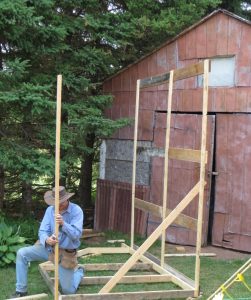
Old Shed (© Magi Nams)
When my family moved to our property in 1991, there were two buildings: a house and a shed near the house. During the next twenty-six years, we made lots of improvements to the house but none to the shed. With time, the shed’s corrugated iron siding and roof showed rust. Two of its windows broke, and we covered the openings. After my husband, Vilis, built a spacious, brand spanking new shop in 2014, he moved his lumber from the shed across the yard to the shop and installed all his tools there. Here’s a picture of the front of the old shed, taken in 2014. It’s pretty dilapidated, isn’t it?
Was the shed—that dark, dirty, soiled structure—really worth saving?
As time went on, the shed deteriorated even more. Its heavy, unwieldy doors sagged and scraped against the ground to the point where we could barely open them. Water seeped in and pooled in low spots on the dirt floor. Mice, rats, squirrels, and even a raccoon family invaded, shredding fiberglass and Styrofoam insulation and leaving their droppings.
In the meantime, I had decided that I wanted a building, too—a place to store my garden tools and plant pots and whatnot. I wasn’t sure exactly how big it would be or what it would look like, but I was sure of one thing—my building was definitely not going to be the old shed. Every time I looked at it, I resented it. It was dark and dirty, almost creepy. I thought it was ugly. There was nothing bright, beautiful, or welcoming about it. I told Vilis that we should get rid of it.
Then, last summer I was paging through a Country Living magazine and came across a picture of a renovated barn with a plank floor, rich brown walls, and a big, open door that looked out onto a green yard. Something about that picture struck a chord in me. I could see myself standing on a plank floor, surrounded by rich brown walls, and facing a big, open door that looked out onto a green yard. The strange thing about this image was that the building I envisioned myself standing inside… was the shed. So, there I was, faced with a question: Was the shed—that dark, dirty, soiled structure—really worth saving?
What about us? Are we worth saving?
Sometimes we might look at people around us, at people in other parts of the world, or at ourselves, and wonder: Are we really worth saving? Maybe our past is dark and dirty. Maybe bad decisions have pooled into ugliness in low places in our lives. Maybe we’ve been invaded by addictions to drugs or alcohol or pornography. Maybe we’ve committed crimes or even atrocities, shredding our morals and leaving them in filthy piles.
Or maybe none of those bleak scenarios apply to us. Maybe we’re simply living, as Thoreau put it, “lives of quiet desperation.” Maybe we go from day to day feeling lost or filled with doubts about who we are and what the future holds. Maybe our hearts sometimes feel cold…or empty. Maybe we’re not sure what it means to love, or even what it feels like to be loved. Are we worth saving?
God thought so. He still does. John 3:16—one of the most quoted verses in the Bible says: For God so loved the world that he gave his one and only Son, that whoever believes in him shall not perish but have eternal life. Verse 17 adds: For God did not send his Son into the world to condemn the world, but to save the world through him.
God sent Jesus to live among humans—God the Son among his creations—so that those creations could be saved. Our lives might be dark and dirty and filled with ugliness of one kind or another—Romans 3:23 states: …for all have sinned and fall short of the glory of God—but God loves us and, yes, he thinks we’re worth saving. He thinks we’re worth a spiritual renovation.
Look at this example. In Matthew 9:9-13, we read: As Jesus went on from there, he saw a man named Matthew sitting at the tax collection booth. “Follow me,” he told him, and Matthew got up and followed him.
While Jesus was having dinner at Matthew’s house, many tax collectors and sinners came and ate with him and his disciples. When the Pharisees saw this, they asked his disciples, “Why does your teacher eat with tax collectors and sinners?”
On hearing this, Jesus said, “It is not the healthy who need a doctor, but the sick. But go and learn what this means: ‘I desire mercy, not sacrifice.’ For I have not come to call the righteous, but sinners.”
For Jesus, Matthew was worth saving. The other tax collectors and sinners he dined with were worth saving.
And then there’s Saul. Think of Saul—persecutor of the early Christian church. Acts 9:1-6 reads: Meanwhile, Saul was still breathing out murderous threats against the Lord’s disciples. He went to the high priest and asked him for letters to the synagogues in Damascus, so that if he found any there who belonged to the Way, whether men or women, he might take them as prisoners to Jerusalem. As he neared Damascus on his journey, suddenly a light from heaven flashed around him. He fell to the ground and heard a voice say to him, “Saul, Saul, why do you persecute me?”
“Who are you, Lord?” Saul asked.
“I am Jesus, whom you are persecuting,” he replied. “Now get up and go into the city, and you will be told what you must do.”
Saul had sanctioned murder against early Christians. He had hunted them down and was planning to throw more of them into prison. Yet Jesus called him and gave him work to do. Saul—renamed Paul—brought the good news about Jesus to Gentiles and founded many of the early Christian churches. As heinous as some of his earlier actions had been, in Christ’s eyes, Saul was worth saving.
Jesus sees beyond the dirt and ugliness to the heart of who we are and who we can be
No matter where we’re at in our lives; no matter where we’ve been in our lives, Jesus sees beyond the dirt and ugliness to the heart of who we are and who we can be. Jesus gave Matthew, a despised tax collector, a new life and new hope. He gave Saul, the persecutor, a new life and new work. He does the same for us. Our spiritual renovation begins with placing our lives in Christ’s hands.
Isaiah 43:19 tells us: See, I am doing a new thing! Now it springs up; do you not perceive it? I am making a way in the wilderness and streams in the wasteland.
Jesus is that way, that path, that guiding track through the tangled wilderness that life sometimes is. Jesus is those life-giving, life-sustaining streams pouring through the wasteland that human thought, word, action, and emotion can be. Jesus came to call sinners. He came for us. And he came for every man, woman, and child in the world around us, no matter how unlikely they might seem as potential Christians.
The shed had the potential to be so much more than what it was
Let’s get back to the shed. I cleaned out all the junk and filth. Then I asked a couple of carpenter friends to take a look and tell me if they thought the building was worth renovating. Both looked beyond the ugly exterior to the heart of the structure and said yes. So, I said yes, too. I would save it. With that decision, the shed was, in my eyes, no longer dark, dirty, and creepy; instead, it had the potential to be so much more than what it was. It had the potential to be beautiful, to be functional in a new way, to bring joy.
We also have the potential to be beautiful, to work in a new way, and to bring joy
2 Corinthians 5:17 tells us: Therefore, if anyone is in Christ, the new creation has come: The old has gone, the new is here! There’s an exclamation mark at the end of that verse. This is exciting! When we declare our faith in Jesus as our savior, we hang the unsaved life we led in the past on the cross with Christ and step into a new realm where he becomes the center of our existence. We’re melded with him by his sacrifice that frees us from sin’s power and enables us to be reconciled with God the Father. When we accept Christ as our savior, we are instantly filled with the potential to be beautiful, to be functional in a new way, and to bring joy.
Galatians 2:20 tells us: I have been crucified with Christ and I no longer live, but Christ lives in me. The life I now live in the body, I live by faith in the Son of God, who loved me and gave himself for me. As Christians, we were bought with a ransom—a terrible and beautiful, loving ransom that we can’t really even begin to understand. That ransom—Christ’s death on the cross for our sins—set us free. It gave us the opportunity for a new life. It gave us hope. It was one perfect sacrifice that could save a world of imperfect sinners.
Engineering a transformation
Now, saving the shed didn’t mean leaving it the way it was. It meant engineering a transformation. Last fall, I hired a carpenter to begin the transformation for me. He tore off the rusted siding and roof. He replaced the shed’s sills so it would have a strong, stable foundation.
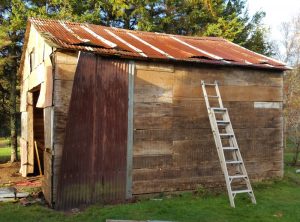
Removing Shed Siding (©Magi Nams)
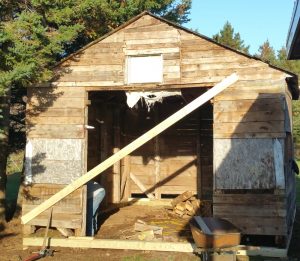
Replacing the Shed’s Sills (© Magi Nams)
The next step was to wrap the building with house wrap and install brand spanking new steel siding and roofing, plastic window panels, and a clapboard face. The carpenter also added easily opened entrance doors and a roll-up garage door that gave me the view I had envisioned—that of a big, open door looking out onto a green yard. Then Vilis added tractor buckets of gravel to the dirt floor, raising it above mud level. At the end of two and a half weeks, the shed didn’t remotely resemble what it had been. It looked classy!
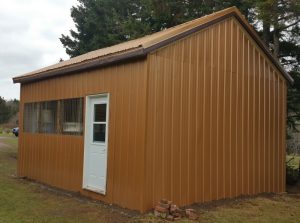
Renovated Shed, rear view (© Magi Nams)
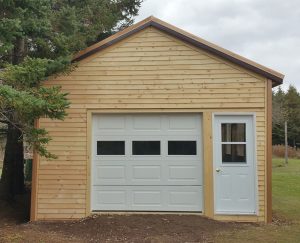
Renovated Shed, front view (© Magi Nams)
Christ’s saving grace doesn’t mean leaving us the way we are
In the same way that my decision to save the shed didn’t mean leaving it the way it was, Christ’s saving grace doesn’t mean leaving us the way we are when we accept him as our savior. It means that we also experience a transformation, in this case, a spiritual renovation. In Hebrews 10:14 we read: For by one sacrifice he has made perfect forever those who are being made holy.
Isn’t that an interesting verse? It almost seems contradictory. For by one sacrifice he has made perfect forever those who are being made holy. The salvation is already here, is already ours the instant we confess with our mouth that Jesus is Lord. In that instant, we are reconciled with God, and when He looks at us, he sees in our place, his beloved Son, Jesus. Salvation is complete, yet we don’t—we can’t—stay the same as we were the instant we accepted Christ. He loves us too much to let us stay that way. He has a future planned for us, and future always means change. Ephesians 2:8-10 reads: For it is by grace you have been saved; through faith—and this is not from yourselves, it is the gift of God—not by works, so that no one can boast. For we are God’s handiwork, created in Christ Jesus to do good works, which God prepared in advance for us to do. With salvation comes change and a progression toward a closer, more intimate relationship with Christ.
Layers to creating beauty
There are layers to creating beauty in an old shed. In June, I stained the clapboard face and wooden soffits with a cedar stain, completing the exterior transformation.
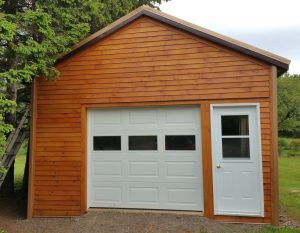
Shed with Cedar Stain (© Magi Nams)
Then I went inside and removed the last of the nails, spikes, screws, and staples that had been inserted into posts and beams and boards during the past thirty years. Curious, I sanded a section of wall boards and revealed, under the weathered grey surface, warm brown hemlock wood. Inspired by that discovery, I sanded all of the wall boards and posts, cleaned away the dust, and painted them with diluted linseed oil. The result was the rich brown walls that I had envisioned.
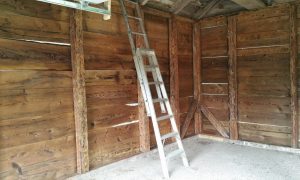
Shed’s Renovated Interior Walls (© Magi Nams)
There are layers to creating beauty in a Christian, too. Developing a strong, stable foundation for our Christian walk means reading God’s Word. Joshua 1:8 tells us: Keep this Book of the Law always on your lips; meditate on it day and night, so that you may be careful to do everything written in it. Then you will be prosperous and successful.
We go beyond ourselves—adding the strength and support of a new siding and roof, as it were—by becoming part of a community of believers—a church, a youth group, a bible study, a prayer group. Hebrews 10:24-25 states: And let us consider how we may spur one another on toward love and good deeds, not giving up meeting together, as some are in the habit of doing, but encouraging one another—and all the more as you see the Day approaching.
As we travel through the years with Christ by our side, the Holy Spirit removes the last nails, spikes, screws, and staples that have pierced our heart during our lifetime. We learn to forgive. We learn to trust God with all our heart and lean not on our own understanding (from Proverbs 3:5-6). We learn to put Christ first. It’s not about us. It’s about him. The old, grey surface of our soul is sanded away, revealing bright new facets of our relationship with Christ, warm new depths of our character, and challenging new works for us to do. For six principles by which spiritual transformation occurs, check out Nancy Leigh Demoss’s post, Transformation: How Does It Happen?
I haven’t finished renovating the shed. I painted the ceiling in late August and early September and after that was done, hired an electrician to install electricity. Next up is the plank floor, which Vilis is currently installing on weekends. Then we’ll add a loft and a workbench.
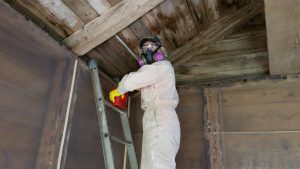
Time to Paint the Shed Ceiling (© Vilis Nams)
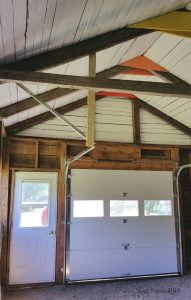
Newly painted shed ceiling (© Magi Nams)
As Christians, we’re not finished yet, either. We’re works in progress, and our spiritual renovation continues throughout our lives. In Philippians 1:4-6 the apostle Paul writes: In all my prayers for all of you, I always pray with joy because of your partnership in the gospel from the first day until now, being confident of this, that he who began a good work in you will carry it on to completion until the day of Christ Jesus. A little farther down, in verses 9-10, he adds: And this is my prayer: that your love may abound more and more in knowledge and depth of insight, so that you may be able to discern what is best and may be pure and blameless for the day of Christ… No matter how old we are or what we spend our time doing, God continues to work within us, guiding us toward a richer existence and a greater degree of likeness to his beloved Son, Jesus Christ.
It’s okay to be ordinary
Even with all the improvements, the shed is a pretty ordinary building. Nothing momentous is going to happen within its walls, but I’ll be happy working in it, and maybe my grandchildren will have fun playing in it.
As Christians, our lives don’t have to be big and momentous to have meaning, to be a blessing to others, or to bring joy to God. We can just be who we are. In 1 Corinthians 7:24, Paul writes, Friends, stay where you were called to be. God is there. Hold the high ground with him at your side.
The Message version of Romans 12:1 says: Here’s what I want you to do, God helping you: Take your everyday, ordinary life—your sleeping, eating, going-to-work, and walking-around life—and place it before God as an offering. Embracing what God does for you is the best thing you can do for him.
So, be at peace. Don’t fret about how to best serve God. The Holy Spirit will lead you. Know that God loves you and that you are definitely worth saving. Know that you will grow in wisdom and discernment and that, as you live out your loving, maturing life in Christ, you bring joy to God.

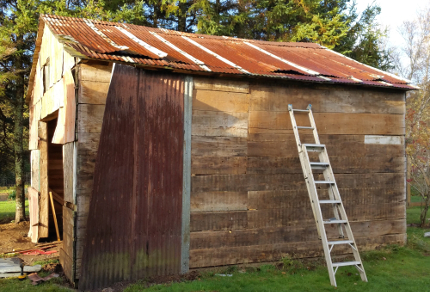

Good evening Magi, and thank you for revealing parts of your life and interests to me, giving me mountain top experiences. How fortunate for me to rediscover you in these times of covid when I am in the tower with my princess, Lynn. I am overwhelmed to have found you and to see how you modestly have become everything I could have wanted for you and then some. I am glad you are younger than me, with a promise more revelations, known and unknown in the future. Your sharings have brought up questions that I would like to ask, the answers may all ready be in writings I have not yet consumed, anticipation though is a wonderful thing. May God continue to Bless you.
Hello, John, and thank you so much for your encouraging words, both now and when I was a student in your Grade 8 class. Life takes us on unusual journeys, doesn’t it? Now that my sons are grown up, I have time to explore my faith in greater depth, and I enjoy sharing some of my discoveries with others. This article was one of my favorites to write, as I loved using my shed renovation as an analogy for spiritual renovation. Blessings to you and Lynn!